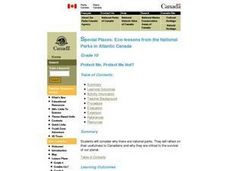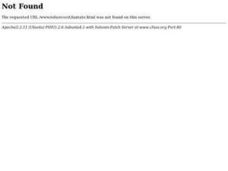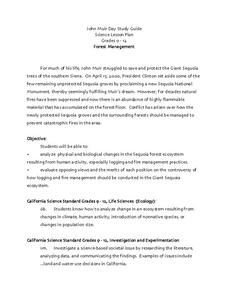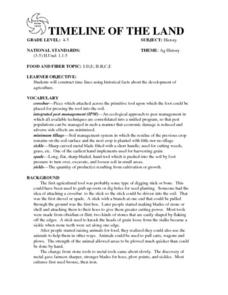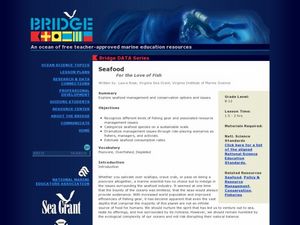Curated OER
the Wonder of Wetlands
Learners explore the importance of the wetland ecosystem, its properties and functions, as well as, the many birds, animals, and plant life found there.
Curated OER
The Portable Niche
Third graders, in groups, research animals, plants, and conditions found in ecosystems.
Curated OER
Furbearers of Illinois
Learners study fur bearing animals of Illinois. They research a specific furbearer (it's habitat, diet, current hunting regulations regarding the animal, conservation organizations that help the animal, etc.) and give a presentation on...
Curated OER
Cleansing, Sparkling Koos
Students explore the importance of water conservation and investigate how plants clean water.
Curated OER
Forest Management
Students analyze physical and biological changes in the Sequoia forest ecosystem, especially logging and fire management practices. They evaluate the controversy of how logging and fire management should be conducted in the Giant Sequoia...
Curated OER
Protect Me, Protect Me Not?
Students brainstorm natural resources found in Canadian National Parks. They, in teams, defend and support conservation efforts and give a presentation. Evaluation consists of speaking on both pro and con sides of a national parks' issue.
Curated OER
Farming in a Fishbowl: How Ethnic Groups in
Seventh graders research Chinese agricultural needs and practices. They conduct an experiment with aquaculture and germinated rice as they take measurements and apply the scientific method.
Curated OER
Lotic Environment
Students assemble a classroom river model as an example of a lotic system. They control and measure biotic and abiotic information for the in-class system and compare data with a lotic system in a natural environment.
Curated OER
Land Use
Students examine ecosystems that covered Illinois 200 years ago, investigate some living and non-living components of ecosystems, identify components of prairie system, create food webs, and observe human effects on environment. Lessons...
Curated OER
Water Use and Conservation
Students discuss the different types of water found on Earth. They discover why not all water is used for drinking and calculate how much water they use. They create their own water conservation plan.
Curated OER
The Arctic and Taiga Ecozone of Canada
Learners discover the differences in the Arctic and Taiga regions of Canada. They identify physical and human characteristics of both region. They also practice using an atlas.
Curated OER
"Honey Dew from Bunny Too!"
The students will design a lab to test the mechanism that triggers spore dispersal. They should have some clues after making observations of the life cycle. Part of the fun here is to let the students devise a method for testing this...
Curated OER
Lotic Environment Lesson Plans
Students create and conduct experiments on a "classroom river habitat." They manipulate the biotic and abiotic factors so that they are able to compare an artificially prepared river model to a naturally occurring lotic ecosystem.
Curated OER
The Arctic and Taiga Ecozone of Canada
Learners examine the various sub-regions of the Arctic and Taiga zones in Canada. Using the online Canadian Atlas, they locate and describe the characteristics of each zone. They organize their information into a chart and share it with...
Curated OER
Making a Food Web and Learning About Ecosystems
Third graders examine the difference between a food web and food chain. They also examine the importance of the sun in a food web and food chain. Students understand what happens when you remove parts of the chain.
Curated OER
How do new species form?
Tenth graders conduct a critical analysis of current evolutionary concepts. They describe how scientists continue to investigate theories. Students examine examples with experimental data that suggest alternative methods of species...
Curated OER
Journey of the Salmon
Third graders predict salmon migration routes and explore how dams affect the salmon migration. They explore the cultural significance of salmon to the Nez Perce people and design technology to aid salmon migration.
Curated OER
The Appaloosa - Horse of the Nez Perce
Fourth graders investigate the use of Appaloosa horses by the Nez Perce Native Americans during the War of 1877. They examine the geography of the area and determine why the Appaloosa horse was suited to this use after looking at...
Curated OER
What is Migration
Learners conduct individual research and participate in discussion be able to identify difference between forced and voluntary migration. They identify if push and pull factors are caused by political, social, economic, or environmental...
Curated OER
Forest Management
Students explore the changes in the Sequoia forest ecosystem. They evaluate reasons for the changes and discuss opposing views of human activity, logging and fire management practices. Students observe a video, describe the location of...
Curated OER
TIMELINE OF THE LAND
Learners construct time lines using historical facts about the development of agriculture. Students research specific dates and events and report their findings to the class. Learners tape or glue the sections together sequentially in a...
Curated OER
Seafood: For the Love of Fish
Students role play a scenario specific to decision making in seafood management and conservation. In this marine science lesson, students estimate seafood consumption in their state. They recommend new regulations for better fishery...
Other popular searches
- Human Population Ecology
- Population Ecology Lab
- Community Ecology Population
- Biology Population Ecology
- Plant Population Ecology
- Population Ecology Plants
- Population Ecology Webquest
- Population Ecology Bacteria
- Population Ecology Web Quest
- Uk Population Ecology
- Population Ecology Graphing
- Census Population Ecology







